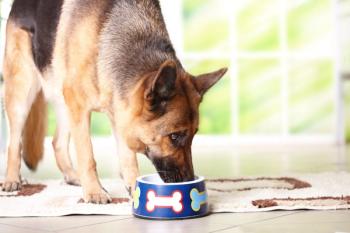
When obesity and chronic kidney disease collide
A review of the literature and an explanation of what is (and isnt) reasonable when it comes to making a treatment plan.
Dora Zett/Shutterstock.comThe “obesity paradox” refers to the finding that an overweight or obese body condition may help protect individuals from mortality when they experience certain disease conditions. The phenomenon's protective mechanism is not clear, but a higher reserve of lean body mass and a lack of cachexia likely play major roles.
Pets and the paradox
Though few studies have investigated the obesity paradox in veterinary medicine, in a recent study, cats below a median body weight of 4.2 kg at the time of chronic kidney disease (CKD) diagnosis had a significantly shorter survival time compared with cats weighing 4.2 kg or more.1 In another study, underweight CKD dogs with a body condition score (BCS) of 1-3/9 had a significantly shorter median survival time compared with moderate (BCS 4-6/9) and overweight dogs (BCS 7-9/9), with no difference between moderate and overweight.2 Yet obesity is a risk factor for the development and progression of CKD in people.3
In a study where dogs gained more than 50 percent of their body weight with a high-fat diet, the experimentally induced obese dogs exhibited increased mean arterial pressure and plasma renin activity, increased glomerular filtration rate and histological changes such as expansion of Bowman's capsule, increased mesangial matrix, thickening of glomerular and tubular basement membranes, and increased cell proliferation in the glomerulus when compared with a lean control group.4
In another study, dogs that lost between 10 and 40 percent of their body weight had evidence of improved renal function, with increased urine specific gravity, decreased urine protein to creatinine ratio (UPC) and decreased levels of biomarkers of renal injury (homocysteine, cystatin and clusterin).5 Creatinine also decreased after weight loss, but this may be confounded by the loss of lean body mass in addition to fat mass. Eight of the dogs in this study had a UPC greater than 0.5 before weight loss, while only one dog fell into this category after losing weight.5
Another study that compared UPC in dogs with a BCS of 4-5/9 to dogs with a BCS of 6/9 or higher found no statistical difference between the groups.6 The researchers in this study were unable to separate overweight from obese dogs for the purpose of additional statistical analysis due to the limited sample size.
A conditional (and conservative) treatment plan
So what do you do with the CKD patient with a BCS score of 9/9? Patients like this must be evaluated on an individual basis to achieve optimal body weight. For animals with later-stage CKD, weight loss isn't reasonable, so treatment for CKD and therapeutic kidney diets generally take precedence. You can, however, consider a weight loss plan for obese dogs and cats in earlier stages of CKD (IRIS stages 1 and 2) but only after
With obese patients, the goal is to eliminate excess, so it's imperative to find out where the excess calories are coming from, such as treats or table foods. [Editor's note:
These are also great cases to potentially refer to board-certified veterinary nutritionists.
References
1. Freeman L, Lachaud MP, Matthews S, et al. Evaluation of weight loss over time in cats with chronic kidney disease. J Vet Intern Med 2016;30:1661-1666.
2. Parker VJ, Freeman LM. Association between body condition and survival in dogs with acquired kidney disease. J Vet Intern Med 2011;25:1306-1311.
3. Zhang X, Lerman LO. Obesity and renovascular disease. Am J Physiol Renal Physiol 2015;309:F273-279.
4. Henegar JR, Bigler SA, Henegar LK, et al. Functional and structural changes in the kidney in the early stages of obesity. J Am Soc Nephrol JASN 2001;12:1211-1217.
5. Tvarijonaviciute A, Ceron JJ, Holden SL, et al. Effect of weight loss in obese dogs on indicators of renal function or disease. J Vet Intern Med 2013;27:31-38.
6. Tefft KM, Shaw DH, Ihle SL, et al. Association between excess body weight and urine protein concentration in healthy dogs. Vet Clin Pathol 2014;43:255-260.
Dr. Martha Cline completed her residency in clinical nutrition before joining Red Bank Veterinary Hospital in New Jersey.
Newsletter
From exam room tips to practice management insights, get trusted veterinary news delivered straight to your inbox—subscribe to dvm360.




